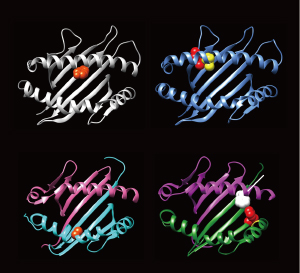Jul. 31, 2015 Research Highlight Medicine / Disease
Immune gene map for Japan
New resource enables scientists to find immunity genes linked to Graves’ disease
 Figure 1: Three-dimensional ribbon models of the four HLA proteins that the study associated with Graves’ disease risk. The colored spheres indicate residues at the amino acid positions associated with Graves’ disease risk. Reprinted by permission from Macmillan Publishers Ltd: Nature Genetics (Ref. 1), copyright (2015)
Figure 1: Three-dimensional ribbon models of the four HLA proteins that the study associated with Graves’ disease risk. The colored spheres indicate residues at the amino acid positions associated with Graves’ disease risk. Reprinted by permission from Macmillan Publishers Ltd: Nature Genetics (Ref. 1), copyright (2015)
A comprehensive panel of the common gene variants that affect the immune system among Japanese individuals has been established by a RIKEN-led team1. The researchers have used this new resource to identify specific immune-related genes that are most strongly associated with the risk of a person developing Graves’ disease, an autoimmune disorder that affects about 30 million people around the world.
“These biomarkers are the best candidates for personalized or precision medicine,” says Yukinori Okada, a genetic epidemiologist at the RIKEN Center for Integrative Medical Sciences, who led the study. He notes that these immune-related genes affect disease risk much more than the other types of gene variants usually used by researchers when searching for predictors of disease.
The stretch of DNA known as the major histocompatibility complex (MHC) includes more than 200 genes that help the immune system recognize foreign substances. It is one of the most genetically diverse regions of the genome. The variation contained within the MHC—specifically in genes that code for the human leukocyte antigen (HLA) genes—underlie individual susceptibility to many diseases, including cancers, mental illnesses, infectious diseases and autoimmune disorders.
Fine mapping of risk variants within HLA genes has mostly been limited to people of European ancestry. Consequently, the resulting databases are not representative of populations found elsewhere in the world. To address this imbalance, Okada, in collaboration with RIKEN geneticist Michiaki Kubo and other colleagues, decided to build a reference dataset of HLA gene variation among individuals of Japanese origin. They did so by inspecting more than 7,000 single DNA polymorphisms in the genomic region encoding the MHC.
The researchers then used this new resource to analyze the association of HLA genes with Graves’ disease, a disorder of the immune system that results in the overproduction of thyroid hormones. Also known as Basedow’s disease, this condition additionally causes bulging eyes, heat intolerance and weight loss. Okada’s team combined their immune gene map with data from a genome-wide association study that included close to 2,000 Japanese individuals with Graves’ disease and around 7,000 healthy controls. They discovered that common variants in four HLA genes (Fig. 1) each independently increase the risk of a person developing the disease.
This knowledge can now help doctors to more effectively identify patients that are most likely to suffer the autoimmune disorder. The Japanese map of HLA genes can also be used to discover risk variants associated with other disorders.
References
- 1. Okada, Y., Momozawa, Y., Ashikawa, K., Kanai, M., Matsuda, K., Kamatani, Y., Takahashi, A. & Kubo, M. Construction of a population-specific HLA imputation reference panel and its application to Graves' disease risk in Japanese. Nature Genetics 47, 798–802 (2015). doi: 10.1038/ng.3310
